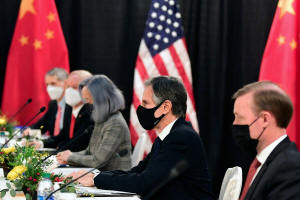U.S., Chinese diplomats clash in high-level meeting of Biden
administration
 Send a link to a friend
Send a link to a friend
 [March 19, 2021]
By Humeyra Pamuk, Michael Martina and David Brunnstrom [March 19, 2021]
By Humeyra Pamuk, Michael Martina and David Brunnstrom
ANCHORAGE, Alaska (Reuters) - The first
high-level U.S.-China meeting of the Biden administration got off to a
fiery start on Thursday, with both sides leveling sharp rebukes of the
others' policies in a rare public display that underscored the level of
bilateral tension.
The run-up to the talks in Anchorage, Alaska, which followed visits by
U.S. officials to allies Japan and South Korea, was marked by a flurry
of moves by Washington that showed it was taking a tough stance, and by
blunt talk from Beijing.
"We will ... discuss our deep concerns with actions by China, including
in Xinjiang, Hong Kong, Taiwan, cyber attacks on the United States,
economic coercion of our allies," U.S. Secretary of State Antony Blinken
told his Chinese counterparts in a highly unusual extended
back-and-forth in front of cameras.
"Each of these actions threaten the rules-based order that maintains
global stability," he said.

The Biden administration has made clear that it is looking for a change
in behavior from China, which has expressed hope to reset relations
between the world's two largest economies that worsened drastically
under former President Donald Trump.
China's top diplomat Yang Jiechi responded with a 15-minute speech in
Chinese while the U.S. side awaited translation, lashing out over what
he said was the United States' struggling democracy, poor treatment of
minorities, and criticizing its foreign and trade policies.
"The United States uses its military force and financial hegemony to
carry out long-arm jurisdiction and suppress other countries," said
Yang.
"It abuses so-called notions of national security to obstruct normal
trade exchanges, and incite some countries to attack China," he added.
'GRANDSTANDING' AND PROTOCOL BREACHES
Throughout Yang's monologue, U.S. National Security Adviser Sullivan and
other officials in the delegation passed notes to each other. At the
end, Blinken held journalists in the room so he could respond.
What is typically a few minutes of opening remarks in front of
journalists for such high-level meetings lasted more than an hour, and
the two delegations tussled about when media would be ushered out of the
room.
Afterwards, the United States accused China of "grandstanding" while
Chinese state media blamed U.S. officials for speaking too long and
being "inhospitable".
Both sides accused the other of violating diplomatic protocol by
speaking too long in opening remarks.
"The Chinese delegation ... seems to have arrived intent on
grandstanding, focused on public theatrics and dramatics over
substance," the official told reporters at the Anchorage hotel where the
meeting was taking place.
"Exaggerated diplomatic presentations often are aimed at a domestic
audience," the official added.
Many netizens on China's social media said Chinese officials were doing
a good job in Alaska, and that the U.S. side lacked sincerity.
Some even characterized the talks as a "Hongmen Banquet", referring to
an event that took place 2,000 years ago where a rebel leader invited
another to a feast with the intention of murdering him.
Still, the two sides reconvened for another meeting on Thursday evening,
and a senior Biden administration official said that the first session
was "substantive, serious, and direct," running well beyond the two
hours originally allotted.
[to top of second column]
|

The U.S. delegation led by Secretary of State Antony Blinken (C) and
flanked by National Security Advisor Jake Sullivan (R), face their
Chinese counterparts at the opening session of U.S.-China talks at
the Captain Cook Hotel in Anchorage, Alaska on March 18, 2021.
Frederic J. Brown/Pool via REUTERS

"We used the session, just as we had planned, to outline our
interests and priorities, and we heard the same from our Chinese
counterparts," the official said in the pool report, adding that a
third session of talks was scheduled for Friday morning.
While much of Biden's China policy is still being formulated,
including how to handle the tariffs on Chinese goods implemented
under Trump, his administration has so far placed a stronger
emphasis on democratic values and allegations of human rights abuses
by China.
China firmly opposes U.S. interference in what it regards as its
internal affairs, issues such as Taiwan, Hong Kong and Xinjiang.
Taiwan's Foreign Ministry said it was expecting the United States to
brief them about the talks.
TERMS OF DISAGREEMENT
Washington says Blinken's Asia tour before the meeting with Chinese
officials, as well as U.S. outreach to Europe, India and other
partners, shows how the United States has strengthened its hand to
confront China since Biden took office in January.
But the two sides appeared primed to agree on very little at the
talks.
Even the status of the meeting became a sticking point, with China
insisting it is a "strategic dialogue", harkening back to bilateral
mechanisms of years past. The U.S. side rejected that, calling it a
one-off session.
On the eve of the talks, the United States issued a flurry of
actions directed at China, including a move to begin revoking
Chinese telecoms licenses, subpoenas to multiple Chinese information
technology companies over national security concerns, and updated
sanctions on China over a rollback of democracy in Hong Kong.

Adding to tensions, China on Friday tried a Canadian citizen on
espionage charges, in a case embroiled in a wider diplomatic spat
between Washington and Beijing.
At the talks on Thursday, Chinese State Councilor and Foreign
Minister Wang Yi questioned Blinken about whether the sanctions were
announced ahead of the meeting on purpose.
Washington has said it is willing to work with China when it is in
U.S. interests, citing climate policy and the coronavirus pandemic
as examples. Blinken said Washington hoped to see China use its
influence with North Korea to persuade it to give up its nuclear
weapons.
Bonnie Glaser, an Asia expert at the Center for Strategic and
International Studies, said tough statements from both sides in the
run-up to the meeting had created a risk that it would devolve into
an exchange of accusations and demands.
"Neither side benefits from this meeting being judged a total
failure," Glaser said.
(Reporting by Humeyra Pamuk in Anchorage and Michael Martina, David
Brunnstrom and Simon Lewis in Washington, and Yew Lun Tian in
Beijing and Ben Blanchard in Taipei; Editing by Mary Milliken, Grant
McCool, Tony Munroe, Michael Perry and Kim Coghill)
[© 2021 Thomson Reuters. All rights
reserved.] Copyright 2021 Reuters. All rights reserved. This material may not be published,
broadcast, rewritten or redistributed.
Thompson Reuters is solely responsible for this content. |